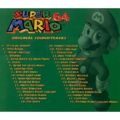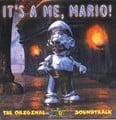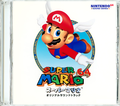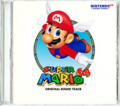Super Mario 64 Original Soundtrack
| It has been requested that at least one audio and/or video file related to this article be uploaded. Please upload music, sound effects, voice clips, or any videos for this article. See the help page for help getting started. |
| Super Mario 64 Original Soundtrack | |
|---|---|
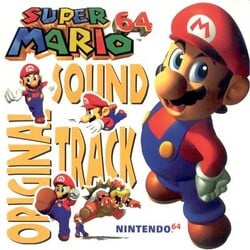
| |
| Composed by: Koji Kondo | |
| Publisher(s) | Pony Canyon, Nintendo |
| Release date | |
| Format | Compact disc |
| Track(s) | 36 |
| Length | 51:14 |
| Catalog number(s) | |
The Super Mario 64 Original Soundtrack (released in Germany as It's a me, Mario! The Original Super Mario 64 Soundtrack) is a video game album that was produced and copyrighted by Nintendo and published by Pony Canyon. The album was released in Japan and North America in 1996 and Germany in 1997. The soundtrack has 34 tracks from Super Mario 64 as well as the "It's a Me, Mario!" voice clip from the game's boot-up sequence; the final track is a bonus piano version of "Piranha Plant's Lullaby" performed by Koji Kondo. The Japanese release is also the first of ten soundtracks in the Nintendo 64 Sound Series.
The soundtrack is featured in Super Mario 3D All-Stars alongside the Super Mario Sunshine Original Soundtrack and Super Mario Galaxy Original Soundtrack, albeit with a slightly altered version of the Japanese cover used to represent it. The soundtrack was released on Nintendo Music on December 23, 2024, having previously being teased in the app's announcement trailer.[5]
The music is also used in the Super Mario Mash-Up Pack in Minecraft, with "Dire, Dire Docks", "Looping Steps", and "Staff Roll" being the only songs not included.
Tracklist[edit]
| # | Title (Japan) | Title (US) | Title (Germany) | Origin | Length |
|---|---|---|---|---|---|
| 1 | "It's me, Mario!" 「マリオだよ」 |
"It's a Me, Mario!" | It's a me, Mario! | Voice: Charles Martinet | 0:04 |
| 2 | TITLE THEME タイトル |
Title Theme | Overture | Used at the beginning of the game | 3:31 |
| 3 | PEACH'S MESSAGE ピーチのメッセージ |
Peach's Message | Kuchen Symphonie | Used when Peach reads her letter, as well as when the player collects enough Power Stars to open a ★ door or Big Star Door | 0:09 |
| 4 | OPENING オープニング |
Opening | Lakitus Luftritt | Used when one of the Lakitu Bros. first appears | 0:35 |
| 5 | SUPER MARIO 64 MAIN THEME メインテーマ |
Super Mario 64 Main Theme | It's a me - die Melodie | Used on the Bob-omb Battlefield; in Whomp's Fortress; on Tall, Tall Mountain; and on Tiny-Huge Island | 2:22 |
| 6 | SLIDER スライダー |
Slider | Country Ride Rollercoaster | Used in Rainbow Ride, in Tick Tock Clock, in the slide areas, in most secret courses, and while the player races Koopa the Quick | 2:50 |
| 7 | CASTLE ピーチのお城 |
Inside the Castle Walls | Treppenhaus Terzett | Used inside the Mushroom Castle | 2:00 |
| 8 | LOOPING STEPS 無限階段 |
Looping Steps | Schicksals Serenade | Used when the endless stairs are in use | 0:28 |
| 9 | WATER ウォーターランド |
Dire, Dire Docks | Aqua Arie | Used in Jolly Roger Bay; Dire, Dire Docks; and The Secret Aquarium | 3:06 |
| 10 | FIRE BUBBLE ファイアーバブル |
Lethal Lava Land | Nirvana Italiana | Used in Lethal Lava Land and Shifting Sand Land | 2:44 |
| 11 | SNOW MOUNTAIN さむいさむいマウンテン |
Snow Mountain | Bibber Berg Blues | Used on Cool, Cool Mountain and in Snowman's Land | 2:58 |
| 12 | HAUNTED HOUSE テレサのホラーハウス |
Haunted House | Hymnus Spukius | Used in Big Boo's Haunt | 3:06 |
| 13 | MERRY-GO-ROUND メリーゴーランド |
Merry-Go-Round | Rummelplatz Ringelpiez | Used in Big Boo's Haunt on the merry-go-round | 1:01 |
| 14 | CAVE DUNGEON どうくつ |
Cave Dungeon | Grüner Grotten Groove | Main theme of the Hazy Maze Cave and Wet-Dry World; also heard in the Cavern of the Metal Cap, inside the pyramid of Shifting Sand Land, in the igloo of Snowman's Land, and in Wiggler's cave on Tiny-Huge Island; a cover version of the Super Mario Bros. Underground Theme | 3:46 |
| 15 | PAKKUN FLOWER'S LULLABY パックンフラワーの子守歌 |
Piranha Plant's Lullaby | Piranha Wiegenlied | Used when the player is near a sleeping Piranha Plant | 2:19 |
| 16 | POWERFUL MARIO 無敵マリオ |
Powerful Mario | Flug Frottola | Used when the player wears a Wing Cap or Vanish Cap, and when the player rides a Koopa Shell | 0:55 |
| 17 | METALLIC MARIO メタルマリオ |
Metallic Mario | Marioraver | Used when the player wears a Metal Cap | 0:55 |
| 18 | FILE SELECT ファイルセレクト |
File Select | Mario Optionato | Used at the File Select screen | 0:44 |
| 19 | CORRECT SOLUTION 謎解き正解音 |
Correct Solution | Schatzruhen Lamento | Used when the player figures out a problem in any level | 0:06 |
| 20 | KINOPIO'S MESSAGE キノピオのメッセージ |
Toad's Message | Chanson de Toad | Used when the player talks to a Toad | 0:06 |
| 21 | POWER STAR パワースター出現 |
Power Star | Stern Song | Used when the player frees a Power Star | 0:09 |
| 22 | RACE FANFARE レースファンファーレ |
Race Fanfare | Hatz Hallali | Used when any type of race starts | 0:06 |
| 23 | STAR CATCH FANFARE パワースターキャッチ |
Star Catch Fanfare | Sternfänger Spiritual | Used after Mario collects a Power Star for the first time, and after clearing either of the first two Bowser courses | 0:05 |
| 24 | GAME START ゲームスタート |
Game Start | Start Chanson | Used at the beginning of every main course | 0:05 |
| 25 | COURSE CLEAR コースクリア |
Course Clear | Here we go! | Used when Mario collects a Power Star | 0:07 |
| 26 | GAME OVER ゲームオーバー |
Game Over | Game Over Gospel | Used after Mario runs out of lives | 0:17 |
| 27 | STAGE BOSS 中ボス |
Stage Boss | Schicksals Signal | Used in the four stage boss battles in the game: the Big Bob-omb on the Bob-omb Battlefield, the Whomp King in Whomp's Fortress, Eyerok in Shifting Sand Land, and Wiggler on Tiny-Huge Island | 1:21 |
| 28 | KOOPA'S MESSAGE クッパのメッセージ |
Koopa's Message | Bowser Boogie | Used at the beginning of the game when the player enters the castle, as well as if the player tries to open an inaccessible door | 0:06 |
| 29 | KOOPA'S ROAD クッパへの道 |
Koopa's Road | Bowser Woogie | Used in all Bowser courses | 2:11 |
| 30 | KOOPA'S THEME クッパのテーマ |
Koopa's Theme | Kampf Kantate | Used in the Dark World and Fire Sea Bowser battles | 2:30 |
| 31 | KOOPA CLEAR クッパクリアファンファーレ |
Koopa Clear | Schlüssel Scharmützel | Used after the player defeats Bowser and claims his key | 0:06 |
| 32 | ULTIMATE KOOPA クッパ3号 |
Ultimate Koopa | Regenbogen Roll | Used in the final Bowser battle | 2:51 |
| 33 | ULTIMATE KOOPA CLEAR クッパ3号クリア |
Ultimate Koopa Clear | Sieges Symphonie | Used after the player clears the final Bowser battle | 0:28 |
| 34 | ENDING DEMO エンディング |
Ending Demo | Finale Grande | Used when Mario is freeing Peach from the castle walls | 1:17 |
| 35 | STAFF ROLL スタッフロール |
Staff Roll | Kuchen Kanzonette | Used in the end credits | 3:27 |
| 36 | PAKKUN FLOWER'S LULLABY パックンフラワーの子守歌(ボーナストラック) |
Piranha Plant's Lullaby – Piano | Piranha Pillepalle | Soundtrack-only song | 2:23 |
Super Mario 3D All-Stars description[edit]
The Nintendo 64 system gave this Mario adventure a more realistic instrumental sound than any prior game in the Super Mario series. This soundtrack enhanced player experiences with arrangements that smoothly transitioned between each 3D space.
Gallery[edit]
Names in other languages[edit]
| Language | Name | Meaning | Notes |
|---|---|---|---|
| Japanese | スーパーマリオ64オリジナルサウンドトラック[1] Sūpā Mario 64 Orijinaru Saundotorakku |
Super Mario 64 Original Soundtrack | |
| German | It's a Me, Mario! (The Original Super Mario 64 Soundtrack)[3] | - |
References[edit]
- ^ a b 近藤浩治* – スーパーマリオ64オリジナルサウンドトラック. Discogs (English). Retrieved February 1, 2025. (Archived February 2, 2025, 03:04:52 UTC via archive.today.)
- ^ Super Mario 64 Original Sound Track. VGMdb (English). Retrieved February 3, 2025. (Archived July 11, 2024, 14:37:16 UTC via Wayback Machine.)
- ^ a b Koji Kondo – It's A Me, Mario! (The Original Super Mario 64 Soundtrack). Discogs (English). Retrieved February 3, 2025. (Archived February 3, 2025, 22:32:26 UTC via archive.today.)
- ^ Although no catalog number is printed on the packaging, the number internally used by Nintendo can be extrapolated from the matrix info on the disc itself. The Allied DT pressing features the matrix string "2488-2-1 ALLIED DT ⁕071860-00⁕", and CDs glass mastered by Allied DT use the matrix format "xxxx-y-y ALLIED DT ✳[release cat#/title]✳".
- ^ "Nintendo Music – Announcement Trailer"
